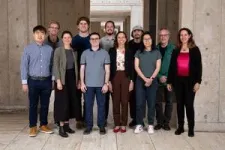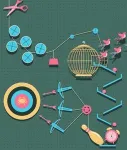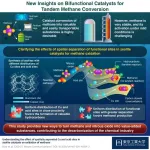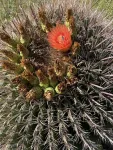(Press-News.org) LA JOLLA (May 15, 2024)—Immunotherapy has revolutionized the way we treat cancer in recent years. Instead of targeting the tumor itself, immunotherapies work by directing patients’ immune systems to attack their tumors more effectively. This has been especially impactful in improving outcomes for certain difficult-to-treat cancers. Still, fewer than half of all cancer patients respond to current immunotherapies, creating an urgent need to identify biomarkers that can predict which patients are most likely to benefit.
Recently, scientists have noticed that patients whose tumors have a mutation in a gene called ARID1A are more likely to respond positively to immune checkpoint blockade, a type of immunotherapy that works by keeping cancer-fighting immune cells called T cells turned “on” when they’d otherwise be turned “off.” Since this ARID1A gene mutation is present in many cancers—including endometrial, ovarian, colon, gastric, liver, and pancreatic cancers—researchers at the Salk Institute wondered how it contributes to treatment sensitivity, and how clinicians can use this information to customize cancer treatments to each patient.
The new study, published in Cell on May 15, 2024, reveals that ARID1A mutation renders tumors sensitive to immunotherapy by inviting cancer-fighting immune cells into the tumor through an antiviral-like immune response. The researchers suggest this mutation and antiviral immune response could be used as a biomarker to better select patients for specific immunotherapies, like immune checkpoint blockade. The findings also encourage the development of drugs that target ARID1A and related proteins as a way of sensitizing other tumors to immunotherapy.
“This could really make a difference in patient outcomes from cancer treatment,” says Associate Professor Diana Hargreaves, senior author of the study. “These ARID1A mutation cancer patients are already having an immune response, so all we need to do is upregulate that response using immune checkpoint blockade to help them destroy their tumors from the inside.”
While it was reported that people with ARID1A mutations responded well to immune checkpoint blockade, the exact relationship between the two remained unclear. To elucidate the mechanism behind this, Salk scientists turned to mouse models of melanoma and colon cancer with either mutated ARID1A or functional ARID1A.
The team observed a powerful immune response in all animal models with mutated ARID1A tumors but not those with functional ARID1A tumors, supporting the idea that the ARID1A mutation was, indeed, driving the response. But how did this work on a molecular level?
“We found that ARID1A plays an important role in the nucleus of keeping DNA properly arranged,” says Matthew Maxwell, first author of the study and a graduate student in Hargreaves’ lab. “Without functional ARID1A, loose DNA can be excised and escape into the cytosol, which activates a coincidentally desirable antiviral immune response that can be further enhanced by immune checkpoint blockade.”
The ARID1A gene codes for a protein that helps regulate the shape of our DNA and maintain genome stability. When ARID1A is mutated, a microscopic chain of events analogous to a Rube Goldberg machine is set off in the cancer cell. First, the lack of functional ARID1A leads to escape of DNA into the cytosol. Next, the cytosolic DNA activates an antiviral alarm system—the cGAS-STING pathway—since our cells are adapted to flag any DNA in the cytosol as foreign to protect us against viral infections. Finally, the cGAS-STING pathway calls on the immune system to recruit T cells into the tumor and activates them into specialized cancer-killing T cells.
With each step relying on the last, this chain of events—ARID1A mutation, DNA escape, cGAS-STING alarm, T cell recruitment—results in more cancer-fighting T cells in the tumor. Immune checkpoint blockade can then be used to ensure these T cells stay “on,” supercharging them to defeat the cancer.
“Our findings provide a novel molecular mechanism by which ARID1A mutation can promote an anti-tumor immune response,” says Hargreaves. “What’s most exciting about these results is their translational potential. Not only can we use ARID1A mutations to help select patients for immune checkpoint blockade, but we now also see a mechanism by which drugs that inhibit ARID1A or its protein complex could be used to further enhance immunotherapy in other patients.”
By outlining the mechanism by which immune checkpoint blockade is more effective for ARID1A mutant cancers, the researchers have provided cause for clinicians to prioritize the immunotherapy for patients with mutated ARID1A. The findings are a major step in personalizing cancer treatment and inspiring novel therapies that target and inhibit ARID1A and its protein complex.
In the future, the Salk team hopes its findings can improve patient outcomes across the many cancer types associated with ARID1A mutations and is set to explore this clinical translation with collaborators at UC San Diego.
Other authors include Jawoon Yi, Shitian Li, Samuel Rivera, Jingting Yu, Mannix Burns, Helen McRae, Braden Stevenson, Josephine Ho, Kameneff Bojorquez Gastelum, Joshua Bell, Alexander Jones, Gerald Shadel, and Susan Kaech of Salk; Marianne Hom-Tedla and Katherine Coakley of Salk and UC San Diego; Ramez Eskander of UC San Diego; and Emily Dykhuizen of Purdue University.
The work was supported by the National Institutes of Health (NCI CCSG P30 014195, T32DK007541, R01 CA228211, R01 CA285867, R01 CA216101, R01 CA240909, R01 AI066232, R21 MH128678, S10-OD023689), National Science Foundation, Howard Hughes Medical Institute, Cancer Research Institute, Pew-Stewart Scholars for Cancer Research, American Cancer Society, and Padres Pedal the Cause.
About the Salk Institute for Biological Studies:
Unlocking the secrets of life itself is the driving force behind the Salk Institute. Our team of world-class, award-winning scientists pushes the boundaries of knowledge in areas such as neuroscience, cancer research, aging, immunobiology, plant biology, computational biology, and more. Founded by Jonas Salk, developer of the first safe and effective polio vaccine, the Institute is an independent, nonprofit research organization and architectural landmark: small by choice, intimate by nature, and fearless in the face of any challenge. Learn more at www.salk.edu.
END
This time, it’s personal: Enhancing patient response to cancer immunotherapy
Salk researchers uncover why patients with ARID1A mutations are more likely to respond to cancer immunotherapy; findings could improve future cancer care and drug development
2024-05-15
ELSE PRESS RELEASES FROM THIS DATE:
A novel multifunctional catalyst turns methane into valuable hydrocarbons
2024-05-15
Methane, a greenhouse gas that contributes significantly towards global warming, is also an important source of energy and an essential chemical resource. When used as a chemical feedstock, methane is typically converted into methanol first and then into hydrocarbons. However, this sequential conversion requires complex industrial setups. More importantly, since methane is a very stable molecule, its conversion into methanol requires tremendous amounts of energy when using conventional means, such ...
Two decades of studies suggest health benefits associated with plant-based diets
2024-05-15
Vegetarian and vegan diets are generally associated with better status on various medical factors linked to cardiovascular health and cancer risk, as well as lower risk of cardiovascular diseases, cancer, and death, according to a new review of 49 previously published papers. Angelo Capodici and colleagues present these findings in the open-access journal PLOS ONE on May 15, 2024.
Prior studies have linked certain diets with increased risk of cardiovascular disease and cancer. A diet that is poor in plant products and rich in meat, refined grains, sugar, and salt is associated with higher risk of death. Reducing consumption of animal-based ...
Bluetooth tracking devices provide new look into care home quality
2024-05-15
Wearable Bluetooth devices can shed light on the care that residents of care homes are receiving and which residents are most in need of social contact, according to a new study published this week in the open-access journal PLOS ONE by Carl Thompson of University of Leeds, UK.
In the UK alone, nearly half a million people reside in some form of care home, including long-term care facilities, nursing homes and residential homes. There is no single reliable method that works well to evaluate care home quality, in part because care homes are complex social systems with diverse interacting groups.
In the new study, researchers tested the feasibility of collecting social network ...
Scientists want to know how the smells of nature benefit our health
2024-05-15
Spending time in nature is good for us. Studies have shown that contact with nature can lift our well-being by affecting emotions, influencing thoughts, reducing stress and improving physical health. Even brief exposure to nature can help. One well-known study found that hospital patients recovered faster if their room included a window view of a natural setting.
Knowing more about nature’s effects on our bodies could not only help our well-being, but could also improve how we care for land, preserve ecosystems and design cities, homes and parks. Yet studies on the benefits of contact with nature have typically focused primarily ...
Singing researchers find cross-cultural patterns in music and language
2024-05-15
Language and music may share evolutionary functions. Both speech and song have features such as rhythm and pitch. But are similarities and differences between speech and song shared across cultures?
To investigate this question, 75 researchers—speaking 55 languages—were recruited across Asia, Africa, the Americas, Europe and the Pacific. Among them were experts in ethnomusicology, music psychology, linguistics, and evolutionary biology. The researchers were asked to sing, perform instrumentals, ...
Killer whales breathe just once between dives, study confirms
2024-05-15
A new study has confirmed a long-held assumption: that orcas take just one breath between dives.
The researchers used drone footage and biological data from tags suction-cupped to 11 northern and southern resident killer whales off the coast of B.C. to gather information on the animals’ habits.
Whaley fun facts
Published in PLOS ONE, the study found that residents spend most of their time making shallow dives, with the majority of dives less than one minute. The longest dive recorded was 8.5 minutes, for an adult male. “Killer whales are like sprinters who don’t have the marathon endurance of blue and humpback whales to make deep and prolonged dives,” ...
Bees and butterflies on the decline in western and southern North America
2024-05-15
Bee and butterfly populations are in decline in major regions of North America due to ongoing environmental change, and significant gaps in pollinator research limit our ability to protect these species, according to a study published May 15, 2024 in the open-access journal PLOS ONE by Sara Souther of Northern Arizona University, US, and colleagues.
Recent research has detected declines in populations of pollinator species, sparking alarm from scientists and policymakers concerned about negative impacts on ecosystems and agriculture. These declines have been linked to various factors including climate change, habitat loss, and invasive species, but ...
Singing researchers investigate cross-cultural patterns in music, language
2024-05-15
Seventy-five researchers from 46 countries recorded themselves performing traditional music and speaking in their own languages in a novel experiment investigating cross-cultural differences and similarities.
With rare exceptions, the rhythms of songs and instrumental melodies were slower than for speech, while the pitches were higher and more stable, according to the study published in Science Advances.
Unique for the number of languages represented – 55 – and the diversity of the researchers, the study provides “strong evidence for cross-cultural regularities,” according to senior author Dr Patrick ...
Animal brain inspired AI game changer for autonomous robots
2024-05-15
A team of researchers at Delft University of Technology has developed a drone that flies autonomously using neuromorphic image processing and control based on the workings of animal brains. Animal brains use less data and energy compared to current deep neural networks running on GPUs (graphic chips). Neuromorphic processors are therefore very suitable for small drones because they don’t need heavy and large hardware and batteries. The results are extraordinary: during flight the drone’s deep neural network processes data up to 64 times faster and consumes three times less energy than when running on a GPU. Further developments of this technology may ...
Summers warm up faster than winters, fossil shells from Antwerp show
2024-05-15
Niels de Winter, affiliated with the Department of Earth Sciences at Vrije Universiteit Amsterdam and the AMGC research group at Vrije Universiteit Brussel, measured alongside colleagues from institutions such as the Institute for Natural Sciences in Brussels the chemical composition of fossil shells from Antwerp, Belgium. Those shells originate from molluscs such as oysters, cockles, and scallops found during the construction works of the Kieldrecht Lock. The molluscs lived lived during the Pliocene, approximately ...
LAST 30 PRESS RELEASES:
Chimps’ love for crystals could help us understand our own ancestors’ fascination with these stones
Vaginal estrogen therapy not linked to cancer recurrence in survivors of endometrial cancer
How estrogen helps protect women from high blood pressure
Breaking the efficiency barrier: Researchers propose multi-stage solar system to harness the full spectrum
A new name, a new beginning: Building a green energy future together
From algorithms to atoms: How artificial intelligence is accelerating the discovery of next-generation energy materials
Loneliness linked to fear of embarrassment: teen research
New MOH–NUS Fellowship launched to strengthen everyday ethics in Singapore’s healthcare sector
Sungkyunkwan University researchers develop next-generation transparent electrode without rare metal indium
What's going on inside quantum computers?: New method simplifies process tomography
This ancient plant-eater had a twisted jaw and sideways-facing teeth
Jackdaw chicks listen to adults to learn about predators
Toxic algal bloom has taken a heavy toll on mental health
Beyond silicon: SKKU team presents Indium Selenide roadmap for ultra-low-power AI and quantum computing
Sugar comforts newborn babies during painful procedures
Pollen exposure linked to poorer exam results taken at the end of secondary school
7 hours 18 mins may be optimal sleep length for avoiding type 2 diabetes precursor
Around 6 deaths a year linked to clubbing in the UK
Children’s development set back years by Covid lockdowns, study reveals
Four decades of data give unique insight into the Sun’s inner life
Urban trees can absorb more CO₂ than cars emit during summer
Fund for Science and Technology awards $15 million to Scripps Oceanography
New NIH grant advances Lupus protein research
New farm-scale biochar system could cut agricultural emissions by 75 percent while removing carbon from the atmosphere
From herbal waste to high performance clean water material: Turning traditional medicine residues into powerful biochar
New sulfur-iron biochar shows powerful ability to lock up arsenic and cadmium in contaminated soils
AI-driven chart review accurately identifies potential rare disease trial participants in new study
Paleontologist Stephen Chester and colleagues reveal new clues about early primate evolution
UF research finds a gentler way to treat aggressive gum disease
Strong alcohol policy could reduce cancer in Canada
[Press-News.org] This time, it’s personal: Enhancing patient response to cancer immunotherapySalk researchers uncover why patients with ARID1A mutations are more likely to respond to cancer immunotherapy; findings could improve future cancer care and drug development








